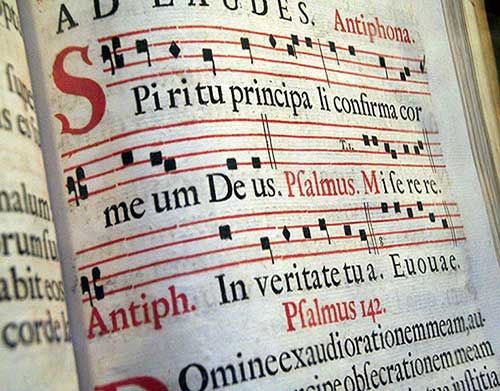The issue has come up again recently: why are there often two different numbers for the same psalm? The Hebrew Bible counted the psalms one way. The Septuagint translation of the Hebrew Bible into Greek counted many psalms slightly differently. The early Christians used the Septuagint, and then went on to translate into Latin (the Vulgate) following the Septuagint numbering. Protestants and Anglicans (Episcopalians) tend to use the Hebrew numbering. Catholics and Orthodox tend to use the Septuagint numbering.
Psalms 1-8 are the same in Hebrew and the Septuagint.
Psalms 9 and 10 in Hebrew are combined as Psalm 9 in the Septuagint.
Psalms 11-113 in Hebrew are Psalms 10-112 in the Septuagint (Hebrew-1 = Greek).
Psalms 114 and 115 in Hebrew are combined as Psalm 113 in the Septuagint.
Psalm 116 in Hebrew is divided into Psalms 114 and 115 in the Septuagint.
Psalms 117-146 in Hebrew are Psalms 116-145 in the Septuagint (Hebrew-1 = Greek).
Psalm 147 in Hebrew is divided into Psalms 146 and 147 in the Septuagint.
Psalms 148-150 are the same in Hebrew and the Septuagint.
If you have a mnemonic for this, do let us know!
If you appreciated this post, consider liking the liturgy facebook page, using the RSS feed, and/or signing up for a not-very-often email, …




When I saw the headline, I thought you were going to be talking about Psalms 14 and 53 as I know them.
Nevertheless, I’m glad to see the explanation here as to why I don’t always agree with a brother as to which psalm is which.
And to complicate things even more, it is common for different translations of the same psalm to delineate the verses differently, so even if you do agree on which psalm it is you often don’t agree on which verse is which.
I know 🙁 Thanks, Bill. Blessings.
As someone who compiles lectionary texts in English based on Russian books, this is definitely frustrating. Then when I go try to compare it with the Greek, it’s even worse; the Greek and Russian rescensions have been drifting apart for a thousand years.
I have dyslexia, numbers are already a mystery. This helps me express what every day simple math was like in school. Still confused, but thanx. lol.
Great explanation, mot sure why anyone would want to use the Hebrew Bible from the Jews of the Diaspora instead of the Septuagint , when Greek of that time was the equivalent of English of our time, the closest thing to a universal language. I’ll try to keep working on a pneumatic, l. Sure have.trouble remembering when to subtract one when!
And, Bryan, the Septuagint was what is mostly quoted in the NT. I love “pneumatic” that might be an autocorrect for “mnemonic”. Blessings.
Psalms 1 to 8, first ones to translate, no change to enumerate.
9 and 10 in Hebrew, 9 in Greek, easy to miss if you’re not keen.
11 to 113 in Hebrew, minus 1 in Greek, that’s clear indeed.
114 and 115 in Hebrew, 113 in Greek, a small tweak to succeed.
116 in Hebrew, two in Greek, not as hard as it may seem.
117 to 146 in Hebrew, minus 1 in Greek, simple and clean.
147 in Hebrew, two in Greek, last but not least, it’s routine.
148 to 150, same in both, a happy ending, like a dream.
That’s too cool, James! Is this yours – or where does it originate? Lent blessings.